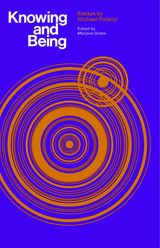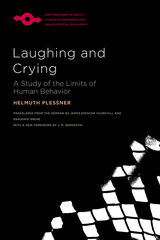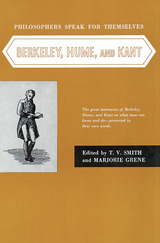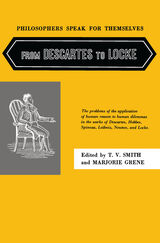6 books about Grene, Marjorie

Descartes and His Contemporaries
Meditations, Objections, and Replies
Edited by Roger Ariew and Marjorie Grene
University of Chicago Press, 1995
Before publishing his landmark Meditations in 1641, Rene Descartes sent his manuscript to many leading thinkers to solicit their objections to his arguments. He included these objections, along with his own detailed replies, as part of the first edition. This unusual strategy gave Descartes a chance to address criticisms in advance and to demonstrate his willingness to consider diverse viewpoints—critical in an age when radical ideas could result in condemnation by church and state, or even death.
Descartes and his Contemporaries recreates the tumultuous intellectual community of seventeenth-century Europe and provides a detailed, modern analysis of the Meditations in its historical context. The book's chapters examine the arguments and positions of each of the objectors—Hobbes, Gassendi, Arnauld, Morin, Caterus, Bourdin, and others whose views were compiled by Mersenne. They illuminate Descartes' relationships to the scholastics and particularly the Jesuits, to Mersenne's circle with its debates about the natural sciences, to the Epicurean movements of his day, and to the Augustinian tradition. Providing a glimpse of the interactions among leading 17th-century intellectuals as they grappled with major philosophical issues, this book sheds light on how Descartes' thought developed and was articulated in opposition to the ideas of his contemporaries.
Descartes and his Contemporaries recreates the tumultuous intellectual community of seventeenth-century Europe and provides a detailed, modern analysis of the Meditations in its historical context. The book's chapters examine the arguments and positions of each of the objectors—Hobbes, Gassendi, Arnauld, Morin, Caterus, Bourdin, and others whose views were compiled by Mersenne. They illuminate Descartes' relationships to the scholastics and particularly the Jesuits, to Mersenne's circle with its debates about the natural sciences, to the Epicurean movements of his day, and to the Augustinian tradition. Providing a glimpse of the interactions among leading 17th-century intellectuals as they grappled with major philosophical issues, this book sheds light on how Descartes' thought developed and was articulated in opposition to the ideas of his contemporaries.
[more]

Geoffroy Saint-Hilaire
A Visionary Naturalist
Herve Le Guyader
University of Chicago Press, 2003
A professor at twenty-one and member of the Napoleon's Egyptian expedition at twenty-six, Geoffroy Saint-Hilaire was a man of one idea, which he formulated when he was twenty-four. Nature, he thought, had formed all living beings with one single plan.
This was a revolutionary idea—and one vigorously opposed by Geoffroy's colleague Georges Cuvier, a great anatomist and one of the giants of French science. In 1830, their long-running disagreement erupted into furious public debate. Geoffroy argued that all vertebrates shared the same basic body plan not just with each other but with insects as well. Cuvier strenuously disputed this idea, which he saw as tantamount to a belief in "transformism"—arguing instead that each species had its own special and permanent form.
With Geoffroy Saint-Hilaire, Hervé Le Guyader provides an analysis not only of that infamous debate but also of Geoffroy's bold intuitions about anatomy and development. Featuring Geoffroy's published version of the 1830 debates—translated into English for the first time—the book also illustrates how Geoffroy's prescient insights foreshadowed some of the most recent discoveries in evolutionary and developmental biology.
This was a revolutionary idea—and one vigorously opposed by Geoffroy's colleague Georges Cuvier, a great anatomist and one of the giants of French science. In 1830, their long-running disagreement erupted into furious public debate. Geoffroy argued that all vertebrates shared the same basic body plan not just with each other but with insects as well. Cuvier strenuously disputed this idea, which he saw as tantamount to a belief in "transformism"—arguing instead that each species had its own special and permanent form.
With Geoffroy Saint-Hilaire, Hervé Le Guyader provides an analysis not only of that infamous debate but also of Geoffroy's bold intuitions about anatomy and development. Featuring Geoffroy's published version of the 1830 debates—translated into English for the first time—the book also illustrates how Geoffroy's prescient insights foreshadowed some of the most recent discoveries in evolutionary and developmental biology.
[more]

Knowing and Being
Michael Polanyi
University of Chicago Press, 1973
Because of the difficulty posed by the contrast between the search for truth and truth itself, Michael Polanyi believes that we must alter the foundation of epistemology to include as essential to the very nature of mind, the kind of groping that constitutes the recognition of a problem.
This collection of essays, assembled by Marjorie Grene, exemplifies the development of Polanyi's theory of knowledge which was first presented in Science, Faith, and Society and later systematized in Personal Knowledge.
This collection of essays, assembled by Marjorie Grene, exemplifies the development of Polanyi's theory of knowledge which was first presented in Science, Faith, and Society and later systematized in Personal Knowledge.
Polanyi believes that the dilemma of the modern mind arises from the peculiar relation between the positivist claim for total objectivity in scientific knowledge and the unprecedented moral dynamism characterizing the social and political aspirations of the last century. The first part of Knowing and Being deals with this theme. Part two develops Polanyi's idea that centralization is incompatible with the life of science as well as his views on the role of tradition and authority in science. The essays on tacit knowing in Part Three proceed directly from his preoccupation with the nature of scientific discovery and reveal a pervasive substructure of all intelligent behavior. Polanyi believes that all knowing involves movement from internal clues to external evidence. Therefore, to explain the process of knowing, we must develop a theory of the nature of living things in general, including an account of that aspect of living things we call "mind." Part Four elaborates upon this theme.
[more]

Laughing and Crying
A Study of the Limits of Human Behavior
Helmuth Plessner; Translated from the German by James Spencer Churchill and Marjorie Grene and with a new foreword by J. M. Bernstein
Northwestern University Press, 2020
First published in German in 1940 and widely recognized as a classic of philosophical anthropology, Laughing and Crying is a detailed investigation of these two particularly significant types of expressive behavior, both in themselves and in relation to human nature. Elaborating the philosophical account of human life he developed in Levels of Organic Life and the Human: An Introduction to Philosophical Anthropology, Plessner suggests that laughing and crying are expressions of a crisis brought about in certain situations by the relation of a person to their body.
With a new foreword by J. M. Bernstein that situates the book within the broader framework of Plessner’s philosophical anthropology and his richly suggestive and powerful account of human bodily life, Laughing and Crying is essential reading for anyone interested in the philosophy of the body, emotions, and human behavior.
With a new foreword by J. M. Bernstein that situates the book within the broader framework of Plessner’s philosophical anthropology and his richly suggestive and powerful account of human bodily life, Laughing and Crying is essential reading for anyone interested in the philosophy of the body, emotions, and human behavior.
[more]

Philosophers Speak for Themselves
Berkeley, Hume, and Kant
Edited by Thomas Vernor Smith and Marjorie Grene
University of Chicago Press, 1957
The philosophic search for truth has been evident in all ages and among all peoples. The developments of each generation require new philosophies and the recasting of old ones. The eighteenth century was no exception, and the scientific advances of the times brought about many innovations in philosophic thought. At a time when scientists were reducing certain phenomena of the natural world to expressions of a few simple mathematical laws, men such as Berkeley, Hume, and Kant were trying to discover how far and on what basis human reason could be applied with similar success in other fields. The selections in this book, preceded by short biographical sketches, document this philosophic search. "The selections are liberal and well chosen, indeed only an examination of the table of contents will give an adequate idea of the value of this volume. . . . How better can one become a modern thinker than by reading and studying at first hand the writings that have made modern thought possible?"—Roger W. Holmes, The Philosophical Review
[more]

Philosophers Speak for Themselves
From Descartes to Locke
Edited by Thomas Vernor Smith and Marjorie Grene
University of Chicago Press, 1940
Modern thought and modes of living have been immeasurably influenced by the philosophers of the Enlightenment—men such as Descartes, Hobbes, Spinoza, Newton, Leibniz, and Locke. Gathered together in this book and preceded by valuable biographical sketches are selections from the basic and most significant writings of each of these men.
[more]
READERS
Browse our collection.
PUBLISHERS
See BiblioVault's publisher services.
STUDENT SERVICES
Files for college accessibility offices.
UChicago Accessibility Resources
home | accessibility | search | about | contact us
BiblioVault ® 2001 - 2024
The University of Chicago Press









